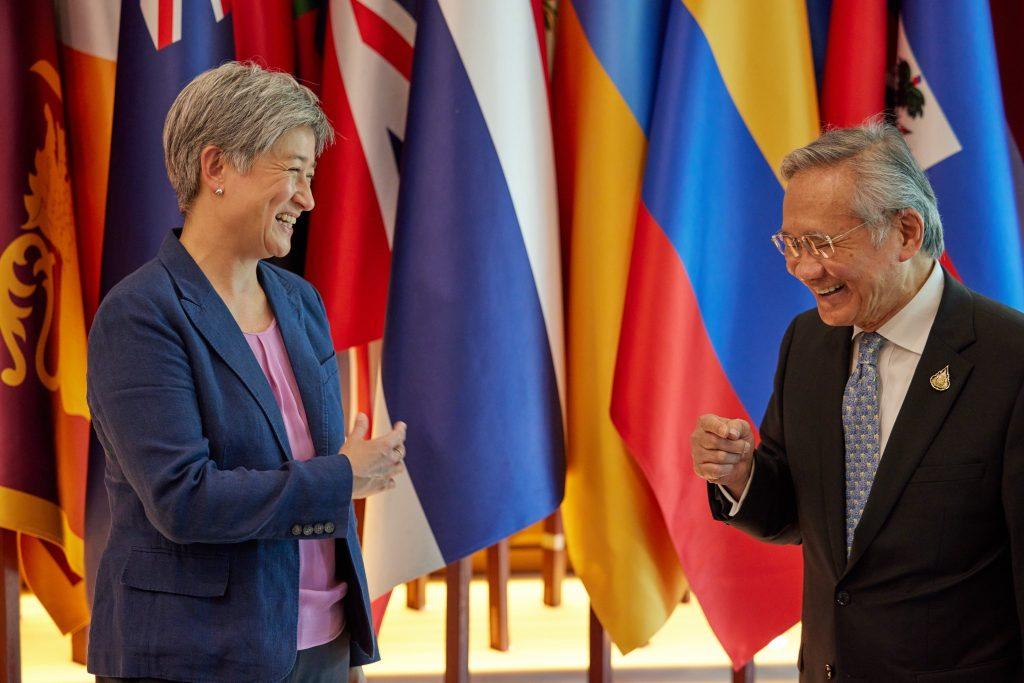
The election of a Labor government in May brought an expectation that Australia would do more in Southeast Asia and the Pacific. But what will that look like and what new approaches should the government take? The region has changed since Labor was last in power, and so has Australia. A policy that relies on more of the same will not suffice in today’s intense environment.
Prime Minister Anthony Albanese and Foreign Minister Penny Wong made a strong start with early visits to the region and a determination to set a better tone. Both promised closer attention to Southeast Asia and the Pacific. They’ve been respectful and shown a willingness to listen.
While the intentions have been communicated, the contours of the reset are still being shaped, and it’s not clear what Labor will do next.
The way I see it, there are three broad options for the new government to reset Australia’s foreign policy in the region.
Labor could embrace its decades-old position of leading a benign, engaging, middle power that is strong on development aid, education and multilateral diplomacy.
It could follow the new direction set by the Coalition government of a more muscular, hard-security-focused balancer, a strategically active, even hawkish, actor.
Or it could try to merge these pathways, which would mean finding the right balance.
The first option would require a significant increase in resources for the Department of Foreign Affairs and Trade, and greater popular support.
The elements are already in place for the second option, given Australia’s strong national security posture and Labor’s continued commitment to big defence procurements such as nuclear-powered submarines. There’s popular support for a more robust approach and a strong sense of threat to the nation’s security and prosperity. The recent budget announcement seems to confirm this trend.
The third option seems the most logical to me. The hard parts will be getting the policy mix right and ensuring a bipartisan consensus so that it lasts as a long-term strategy.
Australia’s strengths have been demonstrated in its contribution to development, gender equality, education, capacity building, agri-tech and new areas of renewable energy in the region. The more strategic and muscular Australia may be criticised in some capitals but appreciated in others. Yet it will be difficult to make that the nation’s strong suit because Australia won’t be seen as the region’s key security actor—at least not Australia alone.
If anything, it will be influential when working in concert with other nations. Australia isn’t always viewed as strategically independent, but it has the advantage of close and trusted relationships with the strongest strategic actors, including the US and Japan.
Australia should have a regionwide guiding framework for engagement, based on universally shared goals of ensuring stability and prosperity throughout Southeast Asia and the Pacific. But it must understand the group dynamics in Southeast Asia and be sensitive to actions that can be perceived as divisive or dismissive of ASEAN’s institutional centrality. As with any country, including the ASEAN member states, Australia should be able tailor its relationships depending on who it is dealing with.
In some cases, the world views, security outlooks and strategies of Southeast Asian nations diverge. Different agendas need different partners. Individual sensitivities, needs and priorities differ, and Canberra should be able to respond to and engage with a range of countries accordingly.
Australia should not base its relationships only on historical predispositions, but also on current circumstances, taking into account the receptiveness and appetite of individual Southeast Asian partners. It cannot afford to be seen as an optional or fluctuating partner.
The new government needs to say what it is pursuing in the region and explain its plan to ‘rebrand’ Australia.
The reset is not just about this government, though. Australia needs to make clear to the region what role it wants to project and live up to now and for years to come. Building a national brand takes time and commitment, so this needs to be a conscious decision with a clear plan.
The region holds great expectations of the Albanese government, especially with Wong—Australia’s first foreign minister of Southeast Asian heritage—leading this new chapter of Australia’s foreign policy.